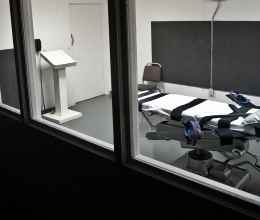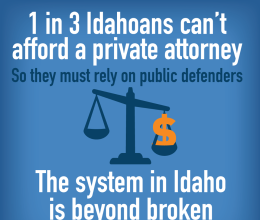
ACLU of Idaho, Idaho Coalition Against Sexual and Domestic Violence, and Immigrant Justice Idaho Demand a Halt to Arrests and the Release from Prisons and Jails of Communities Vulnerable to COVID-19
Groups Additionally Call for the Release of People Currently in Pretrial Detention Because of Cash Bail to Prevent a Public Health Crisis
BOISE — Idaho criminal legal system officials statewide should heed public health experts’ advice and halt arrests statewide and immediately release as many people in jails and prisons as possible, especially individuals in detention who are at high risk of severe illness or death from COVID-19, wrote the ACLU of Idaho, Idaho Coalition Against Sexual and Domestic Violence, and Immigrant Justice Idaho in a joint letter to Governor Brad Little, prosecutors, sheriffs, and police today. In the letter, the groups ask to ensure that system actors are responding to recommendations put forth by public health experts, specifically calling for the immediate release from prisons and jails of communities identified by the Centers for Disease Control and Prevention (CDC) as vulnerable, as well as people currently in pretrial detention, to prevent a public health crisis.
“The efforts that those who administer Idaho’s criminal legal and incarceration system are not enough to secure the health and safety of everyone involved, including people charged by the state and the many personnel in our courts, jails, prisons, and other public facilities,” said Leo Morales, Executive Director of the ACLU of Idaho. “Public health experts recognize that people who are involved in the criminal legal system are at grave risk during this pandemic. From policing, prosecution and pretrial hearings, to sentencing, confinement, and release, every aspect of the system must come under intense scrutiny for how it responds to this national public health crisis.”
Maria Andrade, Executive Director of Immigrant Justice Idaho, said: “All parties and officials agree that the primary concern is to keep our communities safe. It does nothing to promote public health or protect community safety for state or local entities to voluntarily hold people for civil immigration violations.”
In the letter, the three organizations call on:
- Governor Brad Little to suspend parole and commutation rules to allow expedited release of anyone identified by the CDC as particularly vulnerable whose sentence would end in the next two years, to anyone whose sentence would end in the next year, and to anyone currently being held on a technical (crimeless) supervision violation.
- Police and Sheriffs to stop arresting people for minor offenses and in other circumstances issue citations in lieu of arrest so that people can return home, balancing the need for arrest with the overwhelming public safety concerns presented by coronavirus.
- Prosecutors to avoid cash bail requests and move for release in all but the very few cases where pretrial detention is absolutely the least restrictive means necessary to ensure a person’s return to court. They should also institute a review-and-release protocol in cases which bail was already sought in the past 30 days and the person is currently detained.
- Judges to allow anyone with an open criminal case and upcoming hearing the chance to voluntarily waive that hearing or conduct that hearing via telephone or video conference.
- The Idaho Department of Correction and Sheriffs to ensure that facilities are as empty as possible and that hygiene products are free and readily available to staff and anyone who remains incarcerated.
- The Parole Commission to expedite and expand release opportunities for incarcerated people, reducing the population in prisons as recommended by health experts, and institute a presumption for release for all people who have a parole hearing scheduled in the next two years.
- Public health experts and groups such as Dr. Gregg Gonsalves, doctors working in New York City Hospitals, Dr. Marc Stern, Dr. Oluwadamilola T. Oladeru and Adam Beckman, Dr. Anne Spaulding, Homer Venters, and Josiah Rich have all clearly stated that preventing the harm inflicted by SARS-CoV-2 and COVID-19 can become immensely more difficult for people involved in the criminal legal system. By following the recommendations outlined in the letter, state and local officials can create a culture in which transparency, safety, and the health of all people is the paramount concern.
In cases of domestic violence and sexual assault, Idaho’s community and tribal-based domestic and sexual violence programs serving every area in the state continue to provide support to victims and survivors. To locate the program nearest you, you can go to the Idaho Coalition Against Sexual & Domestic Violence’s website at idvsa.org/about-us/members/ or call National Domestic Violence Hotline: 1-800-799-7233 (TTY 1-800-787-3224).

